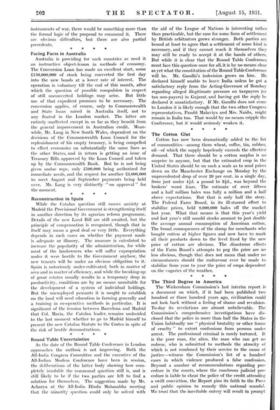Round Table Uncertainties As the date of the Round Table
Conference in London approaches the outlook is not improving. Both the All-India Congress Committee and the executive of the All-Indian Moslem Conference have been in session, the deliberations of the latter body showing how com- pletely insoluble the communal question still is, and is still likely to be if the two parties are left to find a solution for themselves. The suggestion made by Mr. Acharya at the All-India Hindu Mahasabha meeting that the minority question could only be solved with the aid of the League of Nations is interesting rather than practicable, but the case for some form of settlement by British arbitrators grows stronger. Both parties are bound at least to agree that a settlement of some kind is necessary, and if they cannot reach it themselves they may still be ready to accept it at the hands of others. But while it is clear that the Round Table Conference must face this question once for all, it is by no means clear as yet what the constitution of the Round Table Conference will be. Mr. Gandhi's indecision grows on him. He declared himself unable to leave India unless he got a satisfactory reply from the Acting-Governor of Bombay regarding alleged illegitimate pressure on taxpayers (or tax non-payers) in Gujarat, and having got the reply he declared it unsatisfactory. If Mr. Gandhi does not come to London it is likely enough that the two other Congress representatives, Pandit Malay iya and Mrs. Naidu, might remain in India too. That would by no means cripple the Conference, but it would seriously weaken it.






























 Previous page
Previous page